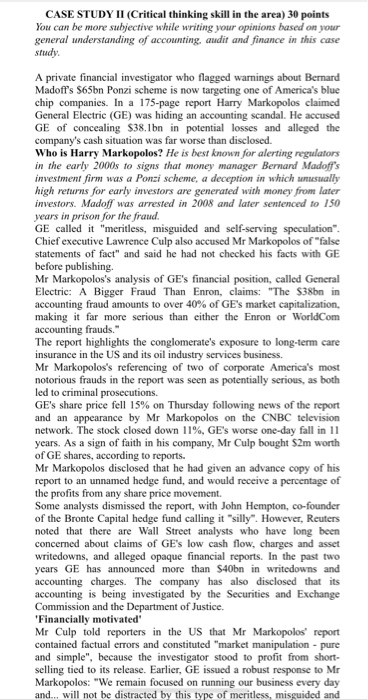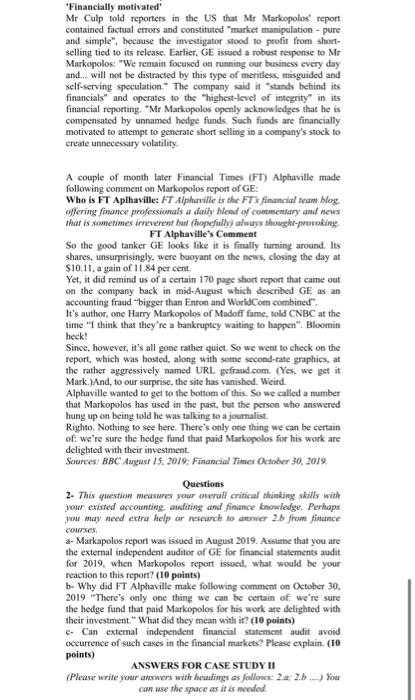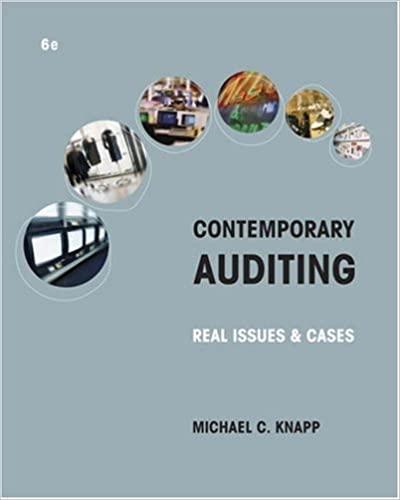CASE STUDY II (Critical thinking skill in the area) 30 points You can be more subjective while writing your opinions based on your general understanding of accounting, audit and finance in this case study. A private financial investigator who flagged warnings about Bernard Madoff's S65bn Ponzi scheme is now targeting one of America's blue chip companies. In a 175-page report Harry Markopolos claimed General Electric (GE) was hiding an accounting scandal. He accused GE of concealing $38.1bn in potential losses and alleged the company's cash situation was far worse than disclosed. Who is Harry Markopolos? He is best known for alerting regulators in the early 2000s to signs that money manager Bernard Madoff's investment firm was a Ponzi scheme, a deception in which unusually high returns for early investors are generated with money from later investors. Madoff was arrested in 2008 and later sentenced to 150 years in prison for the fraud. GE called it "meritless, misguided and self-serving speculation". Chief executive Lawrence Culp also accused Mr Markopolos of "false statements of fact" and said he had not checked his facts with GE before publishing Mr Markopolos's analysis of GE's financial position, called General Electric: A Bigger Fraud Than Enron, claims: "The $38bn in accounting fraud amounts to over 40% of GE's market capitalization, making it far more serious than either the Enron or WorldCom accounting frauds." The report highlights the conglomerate's exposure to long-term care insurance in the US and its oil industry services business. Mr Markopolos's referencing of two of corporate America's most notorious frauds in the report was seen as potentially serious, as both led to criminal prosecutions. GE's share price fell 15% on Thursday following news of the report and an appearance by Mr Markopolos on the CNBC television network. The stock closed down 11%, GE's worse one-day fall in 11 years. As a sign of faith in his company, Mr Culp bought $2m worth of GE shares, according to reports. Mr Markopolos disclosed that he had given an advance copy of his report to an unnamed hedge fund, and would receive a percentage of the profits from any share price movement. Some analysts dismissed the report, with John Hempton, co-founder of the Bronte Capital hedge fund calling it "silly". However, Reuters noted that there are Wall Street analysts who have long been concerned about claims of GE's low cash flow, charges and asset writedowns, and alleged opaque financial reports. In the past two years GE has announced more than $40bn in writedowns and accounting charges. The company has also disclosed that its accounting is being investigated by the Securities and Exchange Commission and the Department of Justice. 'Financially motivated Mr Culp told reporters in the US that Mr Markopolos' report contained factual errors and constituted "market manipulation - pure and simple", because the investigator stood to profit from short- selling tied to its release. Earlier, GE issued a robust response to Mr Markopolos: "We remain focused on running our business every day and... will not be distracted by this type of meritless, misguided and "Financially motivated' Mr Culp told reporters in the US that Mr Markopoles' report contained factual errors and constituted "market manipulation - pure and simple", because the investigator stood to profit from short- selling tied to its release. Earlier, GE issued a robust response to Mr Markopolos: "We remain focused on running our business every day and... will not be distracted by this type of meritless, misguided and self-serving speculation. The company said it "stands behind its financials" and operates to the "highest-level of integrity in its financial reporting, "Mr Markopolos openly acknowledges that he is compensated by unnamed hedge funds. Such funds are financially motivated to attempt to generate short selling in a company's stock to create unnecessary volatility A couple of month later Financial Times (FT) Alphaville made following comment on Markopolos report of GE: Who is FT Aplhaville: FT Alphaville is the FTs financial team blog. offering finance professionals a daily blend of commentary and news that is sometimes irreverent but (hopefully) always thought-provoking FT Alphaville's Comment So the good tanker GE looks like it is finally turning around. Its shares, unsurprisingly, were buoyant on the news, closing the day at $10.11, a gain of 11.84 per cent. Yet, it did remind us of a certain 170 page short report that came out on the company back in mid-August which described GE as an accounting fraud "bigger than Enron and World Com combined". It's author, one Harry Markopolos of Madoff fame, told CNBC at the time "I think that they're a bankruptcy waiting to happen". Bloomin heck! Since, however, it's all gone rather quiet. So we went to check on the report, which was hosted, along with some second-rate graphics, at the rather aggressively named URL gefraud.com. (Yes, we get it Mark.)And, to our surprise, the site has vanished. Weird. Alphaville wanted to get to the bottom of this. So we called a number that Markopolos has used in the past, but the person who answered hung up on being told he was talking to a journalist Righto. Nothing to see here. There's only one thing we can be certain of we're sure the hedge fund that paid Markopolos for his work are delighted with their investment. Sources: BBC August 15, 2019; Financial Times October 30, 2019. Questions 2- This question measures your overall critical thinking skills with your existed accounting, auditing and finance knowledge. Perhaps you may need extra help or research to answer 2.b from finance courses. a- Markapolos report was issued in August 2019. Assume that you are the external independent auditor of GE for financial statements audit for 2019, when Markopolos report issued, what would be your reaction to this report? (10 points) b- Why did FT Alphaville make following comment on October 30, 2019 "There's only one thing we can be certain of we're sure the hedge fund that paid Markopolos for his work are delighted with their investment." What did they mean with it? (10 points) c. Can external independent financial statement audit avoid occurrence of such cases in the financial markets? Please explain. (10 points) ANSWERS FOR CASE STUDY II (Please write your answers with headings as follows: 2a: 2.b ....) You can use the space as it is needed CASE STUDY II (Critical thinking skill in the area) 30 points You can be more subjective while writing your opinions based on your general understanding of accounting, audit and finance in this case study. A private financial investigator who flagged warnings about Bernard Madoff's S65bn Ponzi scheme is now targeting one of America's blue chip companies. In a 175-page report Harry Markopolos claimed General Electric (GE) was hiding an accounting scandal. He accused GE of concealing $38.1bn in potential losses and alleged the company's cash situation was far worse than disclosed. Who is Harry Markopolos? He is best known for alerting regulators in the early 2000s to signs that money manager Bernard Madoff's investment firm was a Ponzi scheme, a deception in which unusually high returns for early investors are generated with money from later investors. Madoff was arrested in 2008 and later sentenced to 150 years in prison for the fraud. GE called it "meritless, misguided and self-serving speculation". Chief executive Lawrence Culp also accused Mr Markopolos of "false statements of fact" and said he had not checked his facts with GE before publishing Mr Markopolos's analysis of GE's financial position, called General Electric: A Bigger Fraud Than Enron, claims: "The $38bn in accounting fraud amounts to over 40% of GE's market capitalization, making it far more serious than either the Enron or WorldCom accounting frauds." The report highlights the conglomerate's exposure to long-term care insurance in the US and its oil industry services business. Mr Markopolos's referencing of two of corporate America's most notorious frauds in the report was seen as potentially serious, as both led to criminal prosecutions. GE's share price fell 15% on Thursday following news of the report and an appearance by Mr Markopolos on the CNBC television network. The stock closed down 11%, GE's worse one-day fall in 11 years. As a sign of faith in his company, Mr Culp bought $2m worth of GE shares, according to reports. Mr Markopolos disclosed that he had given an advance copy of his report to an unnamed hedge fund, and would receive a percentage of the profits from any share price movement. Some analysts dismissed the report, with John Hempton, co-founder of the Bronte Capital hedge fund calling it "silly". However, Reuters noted that there are Wall Street analysts who have long been concerned about claims of GE's low cash flow, charges and asset writedowns, and alleged opaque financial reports. In the past two years GE has announced more than $40bn in writedowns and accounting charges. The company has also disclosed that its accounting is being investigated by the Securities and Exchange Commission and the Department of Justice. 'Financially motivated Mr Culp told reporters in the US that Mr Markopolos' report contained factual errors and constituted "market manipulation - pure and simple", because the investigator stood to profit from short- selling tied to its release. Earlier, GE issued a robust response to Mr Markopolos: "We remain focused on running our business every day and... will not be distracted by this type of meritless, misguided and "Financially motivated' Mr Culp told reporters in the US that Mr Markopoles' report contained factual errors and constituted "market manipulation - pure and simple", because the investigator stood to profit from short- selling tied to its release. Earlier, GE issued a robust response to Mr Markopolos: "We remain focused on running our business every day and... will not be distracted by this type of meritless, misguided and self-serving speculation. The company said it "stands behind its financials" and operates to the "highest-level of integrity in its financial reporting, "Mr Markopolos openly acknowledges that he is compensated by unnamed hedge funds. Such funds are financially motivated to attempt to generate short selling in a company's stock to create unnecessary volatility A couple of month later Financial Times (FT) Alphaville made following comment on Markopolos report of GE: Who is FT Aplhaville: FT Alphaville is the FTs financial team blog. offering finance professionals a daily blend of commentary and news that is sometimes irreverent but (hopefully) always thought-provoking FT Alphaville's Comment So the good tanker GE looks like it is finally turning around. Its shares, unsurprisingly, were buoyant on the news, closing the day at $10.11, a gain of 11.84 per cent. Yet, it did remind us of a certain 170 page short report that came out on the company back in mid-August which described GE as an accounting fraud "bigger than Enron and World Com combined". It's author, one Harry Markopolos of Madoff fame, told CNBC at the time "I think that they're a bankruptcy waiting to happen". Bloomin heck! Since, however, it's all gone rather quiet. So we went to check on the report, which was hosted, along with some second-rate graphics, at the rather aggressively named URL gefraud.com. (Yes, we get it Mark.)And, to our surprise, the site has vanished. Weird. Alphaville wanted to get to the bottom of this. So we called a number that Markopolos has used in the past, but the person who answered hung up on being told he was talking to a journalist Righto. Nothing to see here. There's only one thing we can be certain of we're sure the hedge fund that paid Markopolos for his work are delighted with their investment. Sources: BBC August 15, 2019; Financial Times October 30, 2019. Questions 2- This question measures your overall critical thinking skills with your existed accounting, auditing and finance knowledge. Perhaps you may need extra help or research to answer 2.b from finance courses. a- Markapolos report was issued in August 2019. Assume that you are the external independent auditor of GE for financial statements audit for 2019, when Markopolos report issued, what would be your reaction to this report? (10 points) b- Why did FT Alphaville make following comment on October 30, 2019 "There's only one thing we can be certain of we're sure the hedge fund that paid Markopolos for his work are delighted with their investment." What did they mean with it? (10 points) c. Can external independent financial statement audit avoid occurrence of such cases in the financial markets? Please explain. (10 points) ANSWERS FOR CASE STUDY II (Please write your answers with headings as follows: 2a: 2.b ....) You can use the space as it is needed








